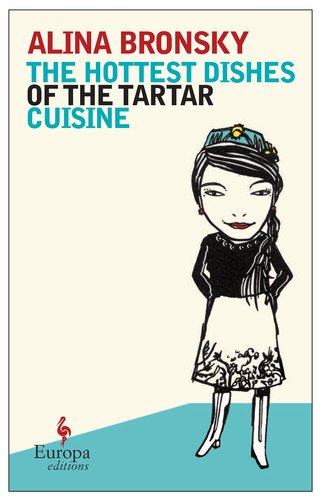Summer Sundays: Beach Reads #13 - HURRICANE EDITION: The Hottest Dishes of the Tartar Cuisine, by Alina Bronsky
I find it endlessly appropriate that as that bitch Hurricane Irene approaches, this week's beach read features another whirling bitch. Alina Bronsky's narrator, Rosalinda, is not unlike a hurricane - single-minded, destructive, persistent, ignorant of the criticism around her and as unreliable as a gust of wind. Her arms spin around her, doing what she thinks is for the best, leaving only destroyed lives and foolishness in her wake. The big difference, of course, is that Rosa is only human and, that being said, we're expected to allow her some folly but, unlike a natural disaster, we eventually expect her to take responsibility for her actions.
I won't deny that Bronsky's novel is funny - Rosa's voice is strong and deliberate, and her ability to see the worst in everyone but herself is kind of amusing in its own right. But there comes a point, for most people it's likely later in the novel than it was for me, when it's not really funny anymore. Rosa does a lot of harm to a lot of people and her casual way of going about it, without truly realizing her effects, can be humorous... until it's not.
That is, until you come to a point (so silently, it creeps up, and you may not recognize it at first) when, for all her preaching and interfering, Rosa is no longer excusable for her actions. For me, this came fairly early-on, most likely due to the fact that, in my day job, I deal with Rosas every day, every hour of every day - women (and some men) who, despite their educations and their upbringing, will stomp all over the lives of anyone who gets in their way, simply to prove their own righteousness, or to have their way. For that reason, Rosa is perhaps less attractive to me as a character than some people might think.
Her wayward behavior is, to me, an incurable turn-off. Rather, it's the characters around her that I find most interesting - the women, especially: her daughter, Sulfia; her seemingly immaculately conceived granddaughter, Aminat; and her Jewish-born granddaughter, Jelena - all who seem somewhat flat on their own, but when examined as versions or facets of Rosa's personality, rather than as real people, that's very interesting.
All three of them are reflective of this matron in one way or another - Sulfia is Rosa's inner ugliness, Aminat is Rosa's outer beauty, and Jelena is representative of Rosa's fears. And maybe the funniest thing about it all, is that Rosa in one way or another hates each of them in turn, recognizing only subconciously, her own faults.
All that being said, I found the book very enjoyable in a demented kind of way. Bronsky's talent really shines through in her narrative ability, though less so in the plot. Things are a little loose on that end, but when you can blame part of that on Rosa's unreliability as a narrator, the gaping holes found in the plot could more accurately be in Rosa's memory - all the more reason to pity her, rather than celebrate her.
I won't deny that Bronsky's novel is funny - Rosa's voice is strong and deliberate, and her ability to see the worst in everyone but herself is kind of amusing in its own right. But there comes a point, for most people it's likely later in the novel than it was for me, when it's not really funny anymore. Rosa does a lot of harm to a lot of people and her casual way of going about it, without truly realizing her effects, can be humorous... until it's not.
That is, until you come to a point (so silently, it creeps up, and you may not recognize it at first) when, for all her preaching and interfering, Rosa is no longer excusable for her actions. For me, this came fairly early-on, most likely due to the fact that, in my day job, I deal with Rosas every day, every hour of every day - women (and some men) who, despite their educations and their upbringing, will stomp all over the lives of anyone who gets in their way, simply to prove their own righteousness, or to have their way. For that reason, Rosa is perhaps less attractive to me as a character than some people might think.
Her wayward behavior is, to me, an incurable turn-off. Rather, it's the characters around her that I find most interesting - the women, especially: her daughter, Sulfia; her seemingly immaculately conceived granddaughter, Aminat; and her Jewish-born granddaughter, Jelena - all who seem somewhat flat on their own, but when examined as versions or facets of Rosa's personality, rather than as real people, that's very interesting.
All three of them are reflective of this matron in one way or another - Sulfia is Rosa's inner ugliness, Aminat is Rosa's outer beauty, and Jelena is representative of Rosa's fears. And maybe the funniest thing about it all, is that Rosa in one way or another hates each of them in turn, recognizing only subconciously, her own faults.
All that being said, I found the book very enjoyable in a demented kind of way. Bronsky's talent really shines through in her narrative ability, though less so in the plot. Things are a little loose on that end, but when you can blame part of that on Rosa's unreliability as a narrator, the gaping holes found in the plot could more accurately be in Rosa's memory - all the more reason to pity her, rather than celebrate her.

Bring this one home with you in Oct. I think I would like to read it.
ReplyDeleteMe~